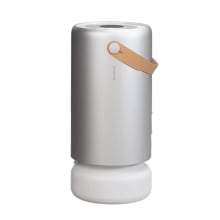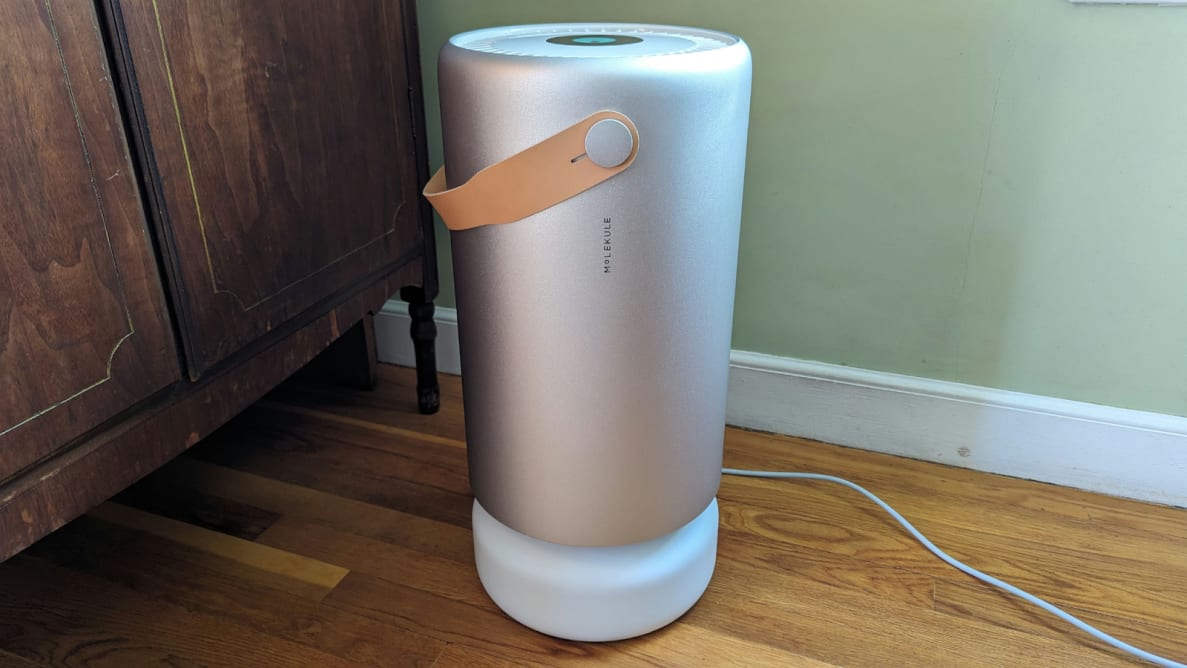Pros
Cons
About the Molekule Air Pro air purifier

The companion app provides breakdowns of your indoor air quality.
- Area coverage: Up to 1,000 square feet
- Dimensions: 10.9 x 10.9 x 23.1 inches
- Weight: 22.9 lbs
- Color options: Silver
- Maximum noise level: 65 decibels
- Filter life: Approximately six months
- Replacement filter: Air Pro PECO-HEPA Tri-Power Filter
The Molekule Air Pro features a rounded tubular construction with a grill on its top and is designed to handle up to 1,000 square feet of space. UV lights illuminate its grill from within. The intake valve is towards the bottom, while a vegan leather carrying strap connects to its top.
The Air Pro’s sensors measure VOCs, CO2, relative humidity, and the three main particle size classes (PM1.0, PM2.5, and PM10).
The Molekule air purifier uses patented PECO technology, employing UV lights to activate a catalyst. The machine has been FDA-cleared as a Class II medical device.
How we tested the Molekule Air Pro air purifier
We test air purifiers two ways: In a controlled lab environment using controlled amounts of smoke and VOCs to measure how rapidly a purifier can eliminate these from a sealed space. Once we have hard data, we have a tester bring it home to get a feel for its use in the real world, responding to day-to-day life, full of cooking, pets, and more.
What we like
The Air Pro offers solid filtration across a variety of use cases

The Air Pro uses an advanced multi-stage filter that includes UV light.
It’s uncommon for an air purifier to be FDA-cleared, but this Molekule air purifier is.
While we can’t test bacteria and virus removal in our labs, we can rely on this FDA clearance as a Class II medical device at fan speeds level three and above—certifying the quality of its filters with a wide range of airborne naughties.
The Air Pro handles pathogens like SARS-COV-2, particulates like smoke, common airborne allergens, and volatile organic compounds (VOCs) thanks to a special combo filter that includes a photoelectrochemical oxidation filter (PECO) in the form of ultraviolet radiation, activated carbon, and a HEPA filter. This is more extensive than the HEPA filtration technology found in most air purifiers, offering consumers a proven alternative.
In our smoke filtration tests, the Molekule had a reasonable smoke removal rate, 47% better than average. The Air Pro's VOC filtration is not as strong, performing only 26% higher than the average.
It provides useful data about your indoor air quality
The Molekule Air Pro has a built-in screen with a menu that is simple yet detailed. It gives you control of what’s happening and access to information. It also offers a smooth experience using the Molekule app, on both iOS and Android.
Users can access reports on your home’s air quality from either the device's screen or its app, and break the info down into different categories of pollutants. This can help you identify a mold infestation or alert you to VOCs released by a gas stove or cleaning products.
Sensor data also controls the Air Pro’s automatic mode. Automatic mode has a standard and "quiet" mode. This quiet mode is responsive but reduces the purifier’s top fan speed, which also reduces its filter power. This means that more peace and quiet comes at the cost of slow pollutant removal.
Additionally, you can set the unit manually, with six different speeds. The highest of these fan speeds, which gives you the aforementioned 1,000 square foot coverage, are quite loud and powerful. Too loud for our liking.
Its sensors can detect chemical pollutants and adjust to capture and eliminate them
The Molekule Air Pro is capable of detecting three sizes of particulate matter, these being PM1.0, PM2.5, and PM10, as well as VOCs, carbon dioxide, and relative humidity. This is leagues beyond the Molekule Mini, which has only a particle sensor.
Interestingly, the Air Pro does what few air purifiers can do—sense chemical pollutants in the air and adjust its fan to capture and eliminate them.
During at-home tests in a ground level location, the Air Pro responded to VOCs emitted from cooking. It was also effectively detected when everyone was asleep upstairs versus walking around based on changing carbon dioxide levels when the room it was sited in wasn't occupied.
In another instance, it picked up oddly high levels of VOCs. Our tester realized that it was responding to a nearby pet pheromone diffuser, used to keep his cats feeling comfy. The purifier was responding to the VOCs from this diffuser and running overtime.
When you first bring the Air Pro into a space, its sensor performs a six-hour calibration before it can hone in on the environment's air quality. This initial VOC calibration will take effect after one hour, but a full calibration takes six hours. Once calibration begins, the purifier will indicate that it needs to be left on for 12 hours for permanent calibration. If it’s switched off during this time frame, it will need to recalibrate. In our experience, this is fairly typical.
The only other air purifier with a comparable sensor to the Air Pro’s is the Dyson PH04 Air Purifier, which can sense even more chemicals.
What we don’t like
Its purchase price and annual running cost will make your eyes water

Don’t try to replace the filter in this purifier with a cheaper third party filter—it won’t work. Credit:
Molekule slapped the Air Pro with an MSRP that's north of $1,000. To boot, owners will have to buy nearly $200 replacement filters twice per year in order to keep the air purifier running as it should. Its proprietary UV light system also means it’s incompatible with third-party filters, so there’s no way to get around costly replacements.
These operating costs are significantly higher than its competitors, although the Dyson PH04 Air Purifier comes close, although it has a niche use case. The Dyson's replacement filters are also less expensive.
Other air purifiers that perform similarly to the Air Pro, like the Winix 5500-2, cost around 75% less. And this is perhaps the Air Pro's biggest downfall.
Noise and UV light glow make it a poor roommate

Beware: Install this in your bedroom and get a nightly light show that you won’t be able to control.
Sure, the Air Pro can handle large spaces, but to do so means it operates incredibly loudly—we measured 65 decibels at high speed. Along with the Molekule Air Mini, this is the loudest we’ve encountered in any air purifier we’ve ever tested.
Pair its whine with a noticeable glow and you'll be up all night long. The purifier's photoelectrochemical PECO technology employs interior UV lights to disarm pollutants. Unfortunately, this bluish light falls outwards from the grills with no way to adjust or dim it.
What owners are saying
Consumer reviews of the Molekule Air Pro are mixed. On Amazon, owners have awarded it a score of 3.9 stars out of 5. On Molekule’s own website the unit scored a 4.4.
Negative reviews cite issues with the longevity of the product, its price, and its noise. Some report that their unit failed after a couple years; others had trouble getting any real customer service help when they experienced issues. A common complaint is that the Air Pro is entirely too loud, with which our experience agrees. Most complaints about the unit are coupled with value critiques about the unit’s high price. We also see positive reviews that appreciate the Air Pro’s sensor capabilities
However, we also wanted to acknowledge that Reviewed's own competition, including Wirecutter and Forbes Vetted, have enthusiastically called Molekule’s air purifiers some of “the worst” air purifiers they’ve ever tested. The data we collected in the controlled environment of our science-based lab solidly refutes that sentiment where the Air Pro is concerned, but we agree with their concerns on two points: the Air Pro’s extreme fan noise is beyond off-putting, and the Air Pro’s exorbitant price tag takes it out of contention for any purchase recommendation.
Should you buy the Molekule Air Pro air purifier?
No, it is simply too expensive to be considered a good value

Open the top of the Molekule air purifier to access its inner filter.
There are specific situations where the Molekule Air Pro air purifier could be life-changing: Maybe you’ve just brought an infant into a freshly built (and painted) home; maybe you live in the heart of the West Coast wildfire crisis; maybe you have a deep chemical sensitivity or underlying condition. In these cases, the Air Pro, with its Class II medical clearance, could be just the thing. But so could the Dyson PH04.
However, for mass market consumers, Molekule's Air Pro air purifier simply does not make sense. With an initial $1,000 purchase price and almost $400 annual operating cost, you could buy six brand new Winix 5500-2 air purifiers in the first year and two every year after that and still spend less money for a comparable performance.

If you're curious about your home's indoor air quality and want your next purifier to come powerful filtration system to combat airborne allergens, look no further than the Molekule Air Pro.
Meet the testers

Gabriel Morgan
Staff Writer, Home
Gabriel Morgan is a staff writer on Reviewed's home team, where he covers consumer education topics such as earthquake preparedness, radon in the home, and concerns about health and wellness in product design. He also writes product reviews and how-to articles on appliances, smart home technology, and goods for the home.

Dr. Dave Ellerby
Chief Scientist
Dave Ellerby has a Ph.D. from the University of Leeds and a B.Sc. from the University of Manchester. He has 25+ years of experience designing tests and analyzing data.
Checking our work.
Our team is here to help you buy the best stuff and love what you own. Our writers, editors, and experts obsess over the products we cover to make sure you're confident and satisfied. Have a different opinion about something we recommend? Email us and we'll compare notes.
Shoot us an email



